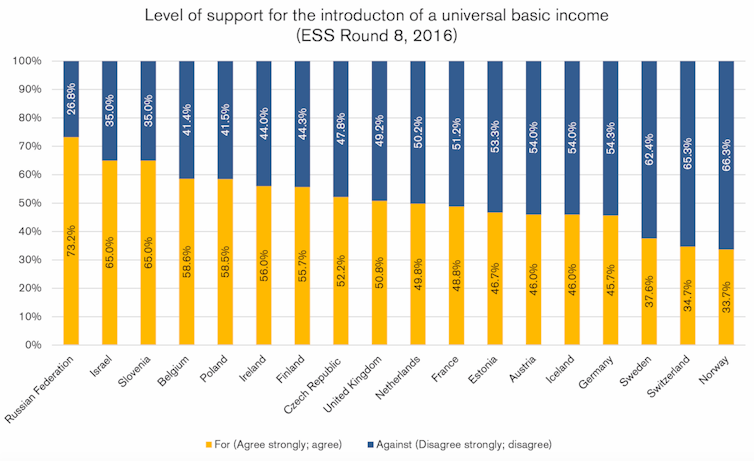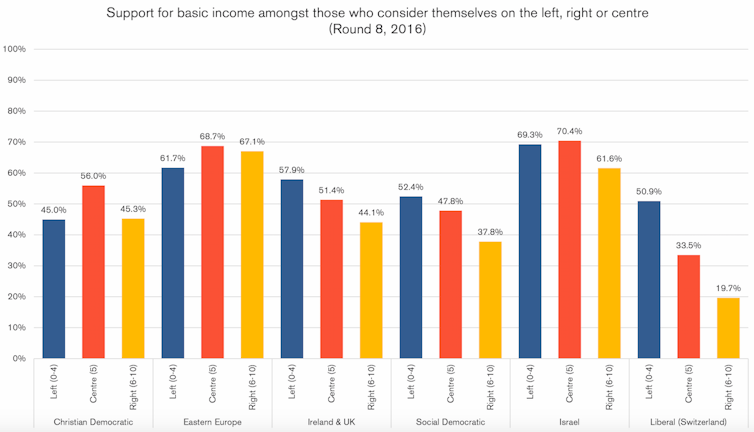Preliminary analysis of a European-wide survey has found young people are more in favour of introducing a universal income than their older peers. Support for such a scheme also varies considerably across Europe, with Russians the most supportive and many Scandinavians the least.
The main idea behind a universal basic income is that everyone receives a regular payment from the state regardless of any other sources of income. So it is paid to someone without a job and a millionaire at exactly the same rate and frequency. It might be just enough to cover basic needs such as food and rent or alternatively a more generous amount.
Some proposed schemes replace other monetary benefits, although one of the potential advantages of many schemes is that they avoid means testing, which makes them easier and cheaper to deliver. Limited pilots have been underway in the Netherlands and Finland but so far there is little empirical evidence of how these have worked. Switzerland held a referendum on introducing such a scheme but comprehensively rejected it.
The hypothetical scheme described to respondents in the most recent European Social Survey included a monthly income to cover essential living costs that replaced many other social benefits. They were told the purpose is to guarantee everyone a minimum standard of living, that everyone receives the same amount regardless of whether or not they are working and that people also keep the money they earn from work or other sources. The scheme itself is paid for by taxes.
The strongest support for a universal basic income was found in Russia and Israel. The weakest support came from respondents in Sweden, Switzerland and Norway. In the UK and the Netherlands, support was split almost 50/50. More than half of respondents in Slovenia, Belgium, Poland, Ireland and the Czech Republic support universal basic income. Levels of support for were below 50% in France, Estonia, Austria, Iceland and Germany.
In Finland, more than 50% of respondents said they favoured the idea, perhaps suggesting that high-profile discussions there about the pilot scheme had led to more positive attitudes.

We also analysed the countries using a scheme based on the welfare state regimes described by Danish sociologist Gøsta Esping-Anderson in his work The Three Worlds of Welfare Capitalism. In figures 2 and 3, the term “Christian Democratic” is used to describe Austria, Belgium, France and Germany, while “Eastern Europe” includes the Czech Republic, Estonia, Poland, Russian Federation and Slovenia. Finland, Iceland, The Netherlands, Norway and Sweden fall under the banner “Social Democratic” countries.
Perhaps the most striking difference is that it is always the youngest who are most in favour of the universal basic income scheme and generally the oldest who are least likely to be in favour. This pattern is certainly the case when it comes to the UK: 61.3% of those aged 15-34 support universal basic income compared with 43.2% of those aged over 65. Note however that in Christian Democratic and Eastern European countries, the over-65s have relatively high levels of support compared with those of similar ages in other country groupings.

In the European Social Survey, we also ask respondents to place themselves on the left-right political scale, where 0 is the far left and 10 is the far right. Those on the right scale tend to be less in favour of universal basic income but support levels even here are perhaps higher than might be expected. Support for basic income actually appears to defy conventional political labels – it is neither right nor left, but something new.

Across all countries we found that, as expected, unemployed people and those in education tend to lend more support to the scheme – as do those on lower incomes. A respondent’s religion, gender and years of education don’t appear to have any particular effect on levels of support for a basic income. In the UK, the disabled and long-term sick had lower levels of support for UBI, perhaps reflecting concerns about losing existing benefits.
There have been advocates for a basic income scheme since the 1800s – these latest trials and increased interest in UBI suggest the debate is likely to continue for many years to come.

